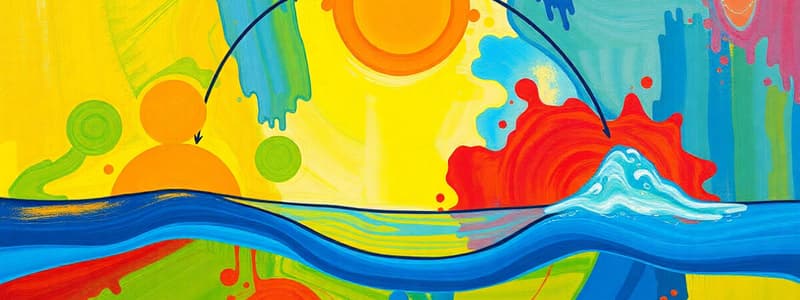Podcast
Questions and Answers
Which of the following is NOT a state of water in the water cycle?
Which of the following is NOT a state of water in the water cycle?
- Steam
- Dust (correct)
- Liquid
- Ice
Evaporation always requires the presence of sunlight.
Evaporation always requires the presence of sunlight.
False (B)
What process involves water vapor cooling and changing back into liquid water?
What process involves water vapor cooling and changing back into liquid water?
Condensation
Water is often called the _____ solvent because it can dissolve many substances.
Water is often called the _____ solvent because it can dissolve many substances.
Match the stages of the water cycle with their descriptions:
Match the stages of the water cycle with their descriptions:
What is the boiling point of water?
What is the boiling point of water?
When ice melts, the temperature of the ice increases until it becomes water.
When ice melts, the temperature of the ice increases until it becomes water.
What is the process of water changing from a liquid to a solid called?
What is the process of water changing from a liquid to a solid called?
The change of water from a liquid to a gas at temperatures below its boiling point is called __________.
The change of water from a liquid to a gas at temperatures below its boiling point is called __________.
Match the following temperature changes with their corresponding state changes:
Match the following temperature changes with their corresponding state changes:
What defines solubility?
What defines solubility?
The solubility of a substance in water is constant regardless of temperature.
The solubility of a substance in water is constant regardless of temperature.
What factor can cause variation in solubility among different substances?
What factor can cause variation in solubility among different substances?
_____ is the amount of a solute that can dissolve in a given amount of solvent.
_____ is the amount of a solute that can dissolve in a given amount of solvent.
Match the following terms with their definitions:
Match the following terms with their definitions:
What occurs during the process of evaporation?
What occurs during the process of evaporation?
Precipitation occurs when water vapor condenses to form clouds.
Precipitation occurs when water vapor condenses to form clouds.
What is the term used to describe a substance that can dissolve in water?
What is the term used to describe a substance that can dissolve in water?
The liquid used to dissolve a substance is called the ______.
The liquid used to dissolve a substance is called the ______.
Match the process with its description in the water cycle:
Match the process with its description in the water cycle:
Which factor does NOT increase the rate of dissolving of a solute in water?
Which factor does NOT increase the rate of dissolving of a solute in water?
A sugar solution is formed when sugar is dissolved in water.
A sugar solution is formed when sugar is dissolved in water.
The process where water vapor cools to form clouds is called ______.
The process where water vapor cools to form clouds is called ______.
What is defined as the maximum amount of solute that can dissolve in a fixed amount of solvent at a specific temperature?
What is defined as the maximum amount of solute that can dissolve in a fixed amount of solvent at a specific temperature?
A saturated solution contains no undissolved solute.
A saturated solution contains no undissolved solute.
What happens to the solubility of most substances as temperature increases?
What happens to the solubility of most substances as temperature increases?
Different substances have different levels of __________ in water.
Different substances have different levels of __________ in water.
Flashcards
Solubility
Solubility
The maximum amount of a substance (solute) that can dissolve in a given amount of liquid (solvent) at a specific temperature.
Variation in Solubility
Variation in Solubility
Different substances have varying abilities to dissolve in water.
Temperature Dependence
Temperature Dependence
The amount of a substance that can dissolve in water changes with temperature.
Evaporation
Evaporation
Signup and view all the flashcards
Condensation
Condensation
Signup and view all the flashcards
Precipitation
Precipitation
Signup and view all the flashcards
Collection
Collection
Signup and view all the flashcards
Water as a Solvent
Water as a Solvent
Signup and view all the flashcards
Melting Point
Melting Point
Signup and view all the flashcards
Melting
Melting
Signup and view all the flashcards
Freezing Point
Freezing Point
Signup and view all the flashcards
Freezing
Freezing
Signup and view all the flashcards
Boiling Point
Boiling Point
Signup and view all the flashcards
What is a saturated solution?
What is a saturated solution?
Signup and view all the flashcards
What is solubility?
What is solubility?
Signup and view all the flashcards
Why do substances have different solubilities?
Why do substances have different solubilities?
Signup and view all the flashcards
How does temperature affect solubility?
How does temperature affect solubility?
Signup and view all the flashcards
Do all substances respond the same way when temperature changes?
Do all substances respond the same way when temperature changes?
Signup and view all the flashcards
What is evaporation?
What is evaporation?
Signup and view all the flashcards
What is condensation?
What is condensation?
Signup and view all the flashcards
What is transportation in the water cycle?
What is transportation in the water cycle?
Signup and view all the flashcards
What is precipitation?
What is precipitation?
Signup and view all the flashcards
What is a solution?
What is a solution?
Signup and view all the flashcards
What is a solute?
What is a solute?
Signup and view all the flashcards
What is a solvent?
What is a solvent?
Signup and view all the flashcards
How does stirring affect the rate of dissolving?
How does stirring affect the rate of dissolving?
Signup and view all the flashcards




